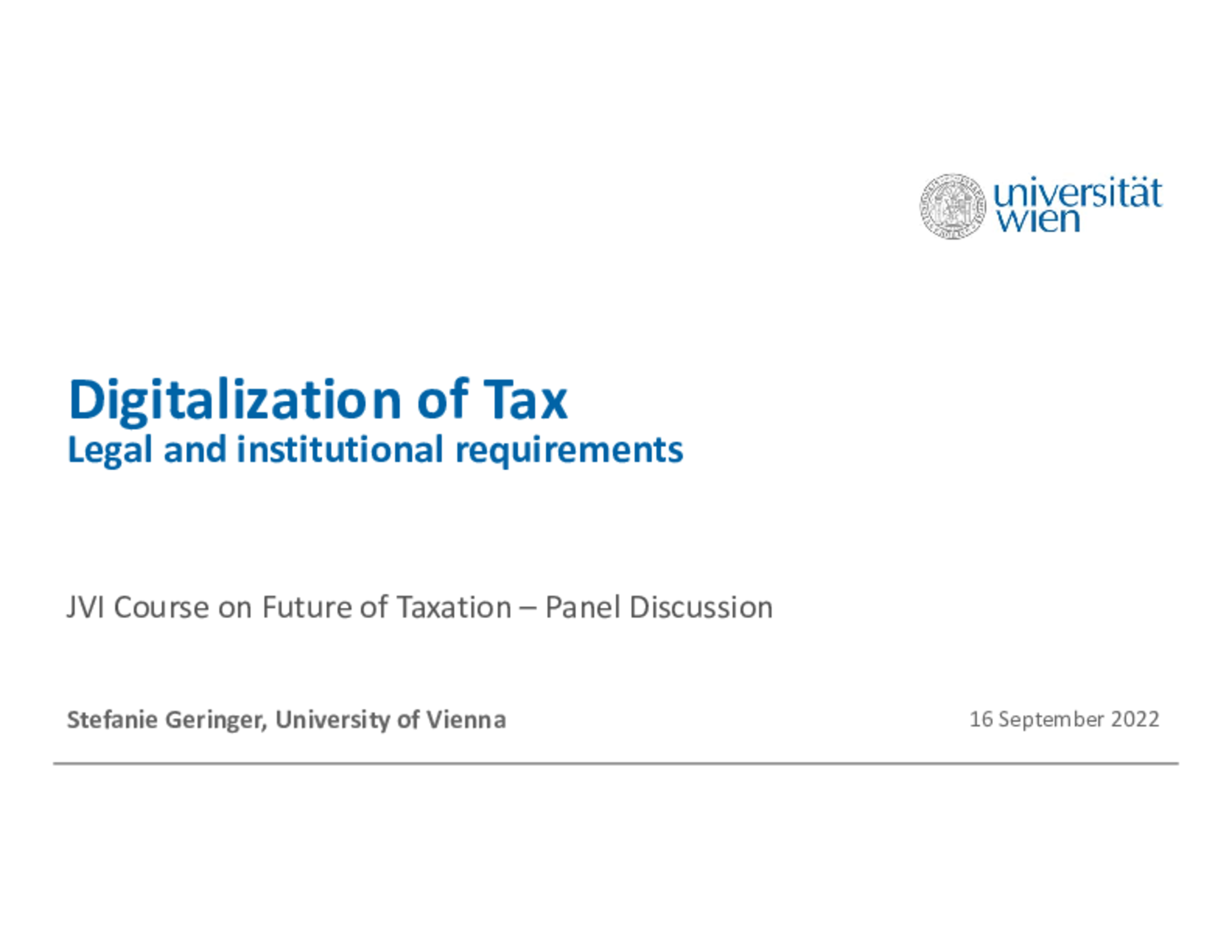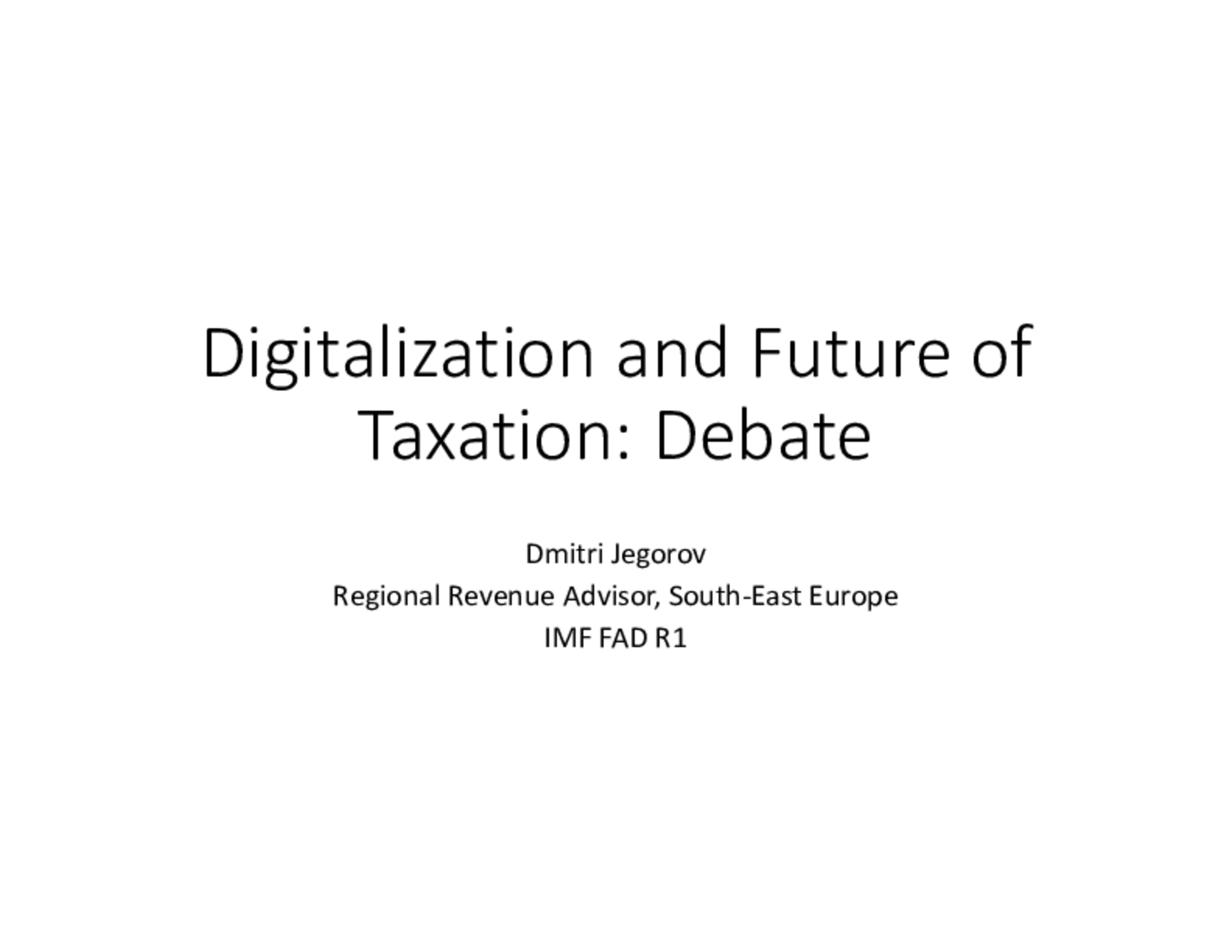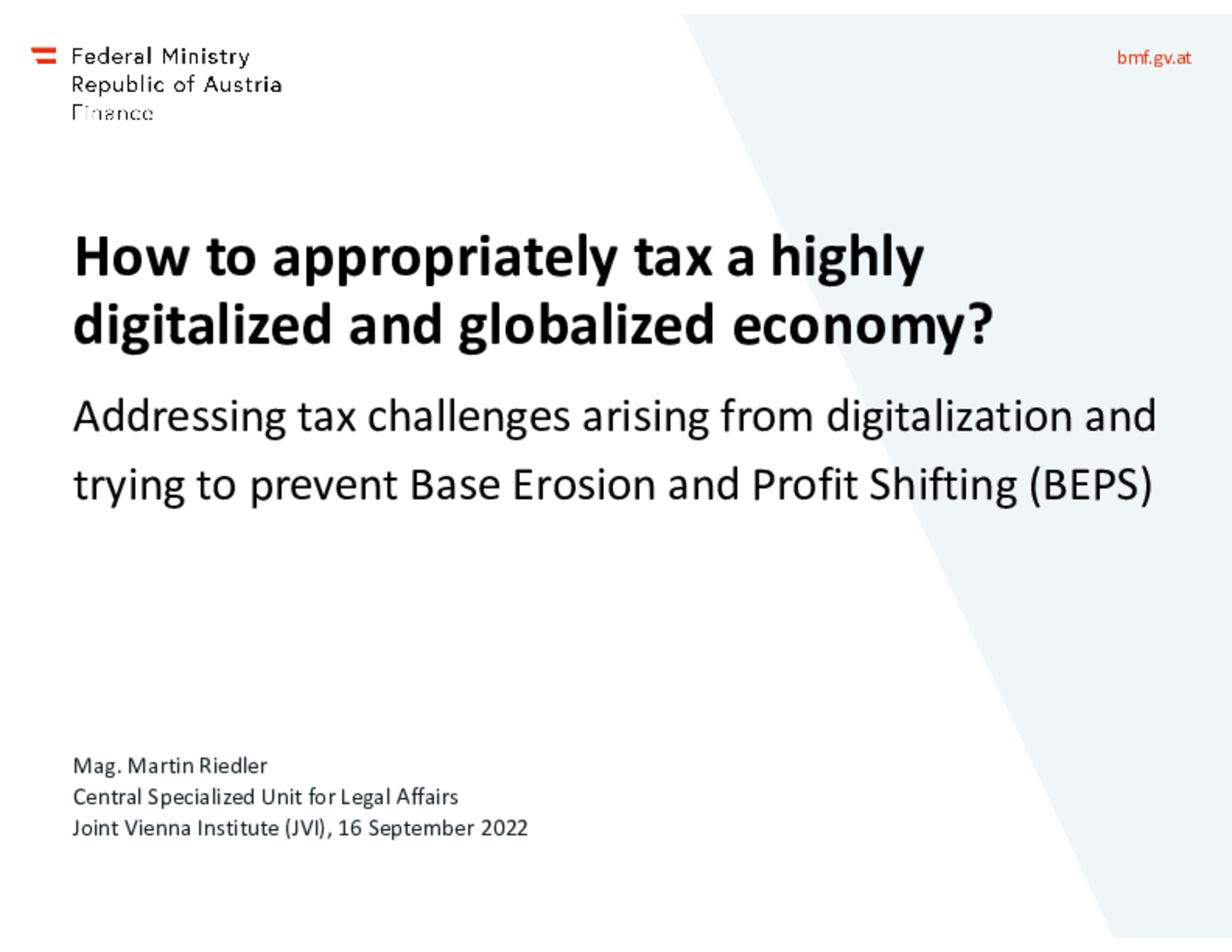The ongoing digital transformation of the economy will undoubtedly shape the future of taxation - a process to which considerable opportunities, but also notable challenges, are ascribed. Digitalization is already having an impact on taxation in several ways. For instance, the rapid growth in e-commerce – spurred by the COVID-19 pandemic - makes it an increasingly important part of the tax base. The growing use of cashless payments leaves a digital trail that can be audited by tax administrations. Requirements to file tax in a digital format, use electronic cash registers, or issue e-invoices can strengthen the efficiency of the tax system and enhance tax compliance, which, in turn, should improve revenue collection and widen a country’s fiscal policy space. Moreover, digital transformation could ease the administrative burden, giving officials more time to focus on higher-value activities. It can also make tax administrations a central hub for real-time information on the state of an economy, which is not only useful for verifying tax information, but can also improve economic forecasting and lead to more targeted and timely formulation of economic policies. Digitalized tax administrations could also serve as a forerunner for the transformation of other parts of the public sector. Despite these potential benefits, the scale and speed of transformation face major challenges. Managing the change, ensuring adequate staffing, addressing the underlying complexity of the tax system, dealing with Base Erosion and Profit Shifting (BEPS) risks, providing the necessary legislation to keep up with digital advances are all critical. Sufficient digital inclusion, data protection and cyber security are also very important.
Against this background, this panel discussion reviewed recent trends and policy solutions and debated the related opportunities and challenges, drawing on the rich experience of renowned tax practitioners and academics. The following conclusions emerged from the discussion:
First, the digitalization of tax administrations requires proper change management, to persuade taxpayers to file taxes electronically, to retrain tax officials and to implement proper human resources strategies. Regarding the former, the example of Estonia was given, where overpaid income tax would be reimbursed earlier if the tax return was submitted electronically. As for the latter, proper staff transition requires the involvement of HR managers from the outset and some additional government spending in the short term. However, digitalization should also lead to greater efficiency, so that part of the associated savings could flow into the retraining or transfer of staff.
Second, the panelists agreed that the introduction of digital solutions has not only made paying taxes easier, but also made tax fraud more difficult. As a result, tax compliance has improved – visible in a significant reduction in tax gaps in recent years (i.e., when comparing the difference between tax revenues with perfect enforcement and actual revenues). For example, the introduction of mandatory e-invoicing and other forms of digital reporting requirements have resulted in significantly reduced VAT gaps. Improved cross-border information sharing and anti-BEPS regulations are also likely to have acted as a deterrent and reduced tax avoidance. Even more potential for improving tax compliance could be tapped – insofar as this is sufficiently possible under the respective data protection law – through a more systematic bundling of big data information from social media platforms, online sales platforms, and digital payment accounts.
Third, there is still significant cross-country heterogeneity in Europe in terms of the extent and impact of digitalization, with Nordic countries, for example, having comparatively smaller VAT gaps. In the EU there are information exchange mechanisms for VAT and direct taxes, with information being stored at the Commission level. Future EU member states must reach a certain level of digitalization to comply with the EU's acquis communautaire. However, there is potential for even more harmonization of standards across Member States, which would reduce compliance costs for businesses operating cross-border and potentially allow existing obligations (e.g., recapitulative statements) to be lifted.
Fourth, the ongoing digitalization of the economy has already had an impact on international tax arrangements and has caused new challenges in this area, as it has further facilitated cross-border profit shifting by some multinational enterprise (MNE) groups. To address the tax challenges posed by the digitalization of the economy, a two-pillar solution to reform international tax rules and establish a global minimum level of taxation has been developed as part of the OECD/G20 Inclusive Framework on BEPS. The panelists emphasized that it is no longer possible to distinguish between traditional and digitalized sectors of the economy, since basically all types of companies already rely on digital components to one extent or another. Therefore, ringfencing the digital economy does not work and recent regulations that are trying to address BEPS issues in this area have a relatively wide scope instead of focusing on certain sectors of the economy or trying to define what is the "digital economy". Related to concerns that there is still no agreement in the EU to adopt a directive to ensure the global minimum level of taxation for MNE groups (Directive for a coordinated implementation of the GloBE [Global anti-base erosion] rules, that were agreed by the Inclusive Framework on BEPS), panelists argued that unilateral implementations of the GloBE rules into national law have already been announced by some EU Member States in case there would be no agreement on a directive. Due to the nature of the GloBE rules, this would result in non-implementing countries missing out on taxing rights, because the implementing countries would be given the taxation rights to tax low-taxed companies in the non-implementing countries.
Fifth and finally, the panelists argued that different starting positions between countries should be considered for the next steps towards digitalizing tax systems. Countries are at different stages of development, but there is a path for everyone. If a country is just beginning to go digital, it should provide facilities for the electronic filing of all types of reports. Countries that already have electronic filing systems could focus more on collecting bulk information about taxpayers and their obligations, also using information from third parties. If, for example, tax-relevant information had already been sent to a government agency, it was the duty of the tax authorities to obtain the information from there. Panelists also argued that at some point in the future tax administrations may no longer be needed, at least not to the extent that we currently have, as tax-related information is embedded in corporate accounting systems or digital payment records, and tax administrations algorithms could easily be applied to these verified systems.
Markus Eller, Senior Economist, JVI












